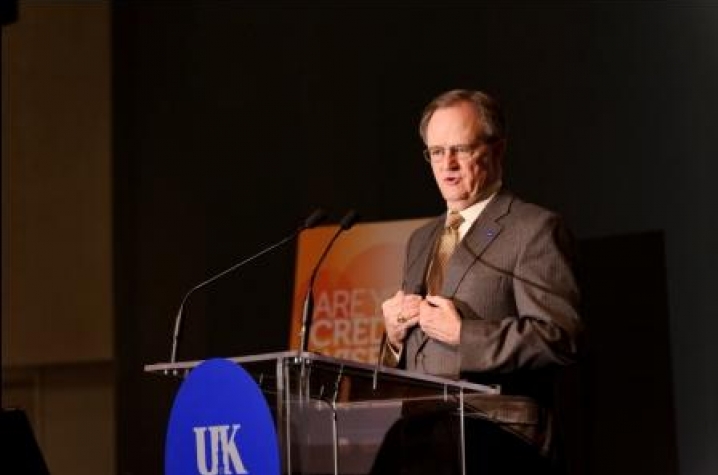Open Your Eyes, Get Credit Wise
LEXINGTON, Ky. (Jan. 20, 2010)– University of Kentucky President Lee T. Todd Jr. and men’s basketball coach John Calipari urged students to practice credit-wise spending habits and reaffirmed UK's commitment to financial literacy this morning.
"The University of Kentucky has an important educational role to play in equipping students with money management skills, which is a responsibility we’re making a priority," Todd said. “Without a formal financial education infrastructure in the state or nationally, efforts such as the personal finance classes featured in family studies, the financial literacy curriculum in our UK 101 classes, and today's 'Are You Credit Wise?' program are filling those gaps.”
“With my team, I'm constantly stressing the need for creating good habits and being the teammate you would like to play with,” said Calipari. “Financial education works in the same way – students respond to money management information best if it comes from another student, and that’s why I think a peer-to-peer teaching model works so well.”
"Learning how to set a budget and read a credit report is one thing most students aren’t taught in school,” said UK senior and Are You Credit Wise? ambassador Kayla Klein, who followed Todd and Calipari's remarks with a student-focused financial literacy seminar sponsored by UK's Student Government Association and UK's College of Social Work.
“Many of us come to college, sign up for our first credit card or take out large student loans without understanding how to manage them properly, nor the long-lasting consequences of not doing so," said Klein. "Throughout the semester I’ve presented the Are You Credit Wise? curriculum all over campus, hoping to change the sometimes irresponsible spending habits that most of us are guilty of. The average four-year college student in Kentucky graduates with an average credit card debt of $19,112, so it’s obvious that we need to better understand our finances before we get in over our head.”
Klein is one of 10 students nationwide participating in the peer-to-peer financial literacy program, created by MasterCard Worldwide 12 years ago to teach college students the fundamentals of good credit habits, including reading and understanding credit reports, budgeting, responsible use of payment cards and building a good credit history. To date, Are You Credit Wise? has reached more than 520,000 students on nearly 80 college campuses.
“Financial literacy is an issue in which I have taken a personal interest,” said Calipari. “Through the Calipari Family Foundation for Children, Ellen and I have worked with Washington, D.C.-based EverFi, local/civic leaders and banking executives, as we prepare to launch ‘Coach Calipari’s FisCal Responsibility Program: Financial Literacy for Youths.’ This will be geared to children in grades four through six as we attempt to educate young people earlier in life about the benefits of saving and responsible spending. The program will focus on fun, computer-based interactive ways for youngsters to learn about fiscal responsibility."
Illustrating the need for increased financial education in the state, a recent study funded by the FINRA Investor Education Foundation found that Kentucky is the second-worst performer in the U.S. when it comes to saving money in a “rainy day fund” to cover expenses in case of emergency and the third-worst when it comes to answering financial literacy questions.
These numbers are exacerbated at the college level. Of the 84 percent of undergraduates who have credit cards, the average credit card balance is more than $3,100, and many students use their credit cards for direct education expenses, a whopping $2,200 on average, according to a 2009 national report by Sallie Mae.
"Becoming more knowledgeable about personal finance is essential," said UK social work Professor Kay Hoffman. "I want our students to graduate from college with as little debt as possible and certainly without unnecessary debt. Debt keeps young people from exploring, taking risks, making the world better and enjoying every day."
Almost 90 percent of college students say they want more financial education, but few schools or communities have the ability to provide it. In Kentucky, there is no requirement for financial education in high school, and no state or federal requirements exist at the college level either, when most young adults get their first credit card and develop spending and credit habits that can last a lifetime.
Financial literacy programs are extremely important, especially on college campuses, said Martie Gillen, assistant dean for finance and center administration for the College of Social Work.
"Many students do not have the knowledge they need to make informed financial decisions, and they often end up learning personal finance as a result of making uninformed decisions," explained Gillen, who teaches personal and family finance for the Department of Family Studies and is developing similar coursework for the College of Social Work. "Financial mistakes made in college can have consequences that last. As an educator, if I can help students avoid having to learn from their financial mistakes, then I feel that I have done some good."
In addition to Family Studies classes and Klein's presentations, some UK 101 and 201 classes include lectures on financial literacy, and UK's Cooperative Extension specialists in the College of Agriculture have revamped their Moneywise website as a part of the college's Managing in Tough Times Initiative.
“We want to continue to assist people with economic recovery and help them prepare for their financial future,” said Jennifer Hunter, UK assistant extension professor in family finance.
"Students have told me that they’re so relieved to be having a conversation and lesson about finance, as it’s not something they’re used to talking about with their families or at school," added Klein. "I’m just trying to start a dialogue among my peers and to get financial information into as many hands as I can."







